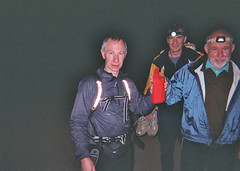Mark van Harmelen is an e-learning and a social software consultant, and also an Honorary Research Fellow at the University of Manchester’s School of Computer Science.
The UK is increasingly focusing on the development of Personal Learning Environments (PLEs) after a slow start that began with client systems such as Colloquia (2000) and the Manchester PLE/VLE Framework (2004). This week saw a two-day meeting (on 6 and 7 June) organised by CETIS and held in Manchester. The meeting comprised an initial ‘experts’ only day, and a second public day.
What became apparent at the workshop is that the name PLE now encompasses two major flavours of architecture:
- Client systems such as CETIS’s own PLE, PLEX.
- Web-based server and browser systems, building on Web2.0 tools including aggregators, blogs and wikis.
Importantly, and picking up on threads that have been emerging in the Blogosphere over the last two and a half years, PLEs are increasingly seen as a vehicle for self-directed and group-based learning, where individual learners construct their own agendas and learning programmes to satisfy their own learning goals. As such, the PLE revolution harbours two important threads, a change in learning style in institutions, and a spilling over of learning technology from institutions to non-institutional life.
In that many of the more hard-line proponents of PLEs feel that even blogs and RSS aggregators can constitute a personal learning environment, we are already seeing wholesale adoption of PLEs in contexts outside of traditional institutional learning setting. This much is sweet news to those proponents of the original idea of PLEs, that PLEs are needed to provide lifelong learning environments across different institutions and CPD suppliers.
In fact, PLEs, as generally agreed on in the CETIS meeting, are seen as making possible a fundamental shift that can be characterised in a number of dimensions; moving towards greater autonomy, diversity, openness and connectedness in education.
However, all is not rosy, and there was a general degree of concern about possible institutional responses to the coming PLE revolution: That PLEs in their most useful incarnations can only be used to full advantage with a fundamental change in pedagogic practice and that institutions may be wary of a consequent loss of control of their teaching and learning processes. Perhaps, then, from an institutional point of view, it was no coincidence that the first day of the workshop was scheduled on the much touted date of 666.
Useful links:
CETIS PLEX Blog, their download page, and a selection of screenshots of PLEX in action.
Elgg, a PLE-like environment initially conceived as a response to increased institutionalisation of e-portfolios.
The half-hour PLE, a simple PLE built in half an hour.
A resource on PLEs, still under some development -- "A great general resource containing numerous references and descriptions of resources on personal learning environments" Steven Downes (thanks Steven).
A useful note from Graham Attwell who refers to Derek Morrison discussing the potential dissonance between PLE use and the industrialisation of education.
warwickblogs, the University of Warwick's bold experiment in student blogging.
To contact the author email: mark -a-t- cs.man.ac.uk
 Between 11 and 14 June (and this is one reason why Fortnightly Mailing has had a hiatus) - just prior to the current crisis in Gaza - I was fortunate to go to East Jerusalem and Hebron, Ramallah, and Bethlehem in the West Bank.
Between 11 and 14 June (and this is one reason why Fortnightly Mailing has had a hiatus) - just prior to the current crisis in Gaza - I was fortunate to go to East Jerusalem and Hebron, Ramallah, and Bethlehem in the West Bank.


When did you last see your data, and who do you trust to keep it safe?
This 8/6/2006 article by SA Mathieson in the Technology Guardian struck a chord with me as I've always felt that if I wanted to trust my personal data (an ePortfolio, say....) to a third party, I'd prefer to let the Co-op Bank handle it, than an institution, or the Government. The article has the following introduction:
SA Mathieson's article in the Guardian. Access page for the Information Commissioner's What Price Privacy? Report.
Posted on 04/07/2006 in News and comment | Permalink | Comments (0)
|